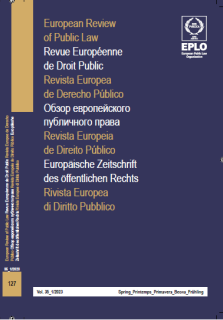
The Emergence and Potential of Climate Change Litigation:
Methodological and Theoretical Legal Challenges
Lecturer in Administrative Law, Universidad Autónoma de Madrid
Nearly twenty years have passed since the timid appearance of the first-wave climate change cases. Within this period, legal literature and practitioners have progressively identified in climate litigation a useful tool to reinforce the global public-private efforts in the fight against climate change. There can be no doubt that climate litigation sparks fervent debate and promotes social debate by elevating public awareness on the topic. Climate litigation’s strategic character aims at making science and information more accessible to public opinion in democratic regimes. However, the lack of concrete empirical studies that could measure its overall effectiveness in promoting climate goals, the delimitation of the margin of control that judges hold when adjudicating political-scientific issues and the legal theoretical hurdles in rights-based litigation are a constant source of debate between scholars. Despite all the controversy, it is an undeniable fact that strategic climate litigation has been following a clear upward trend in the last seven years undergoing a dynamic process of transformation with an impact on diverse legal issues such as: the relation between politics, science and law, the principle of separation of powers, the causation rules, the rules on proof and access to justice in climate matters. This article intends to offer an overall view of all the above issues in an attempt to better define - from a comparative transnational perspective - the current state of the phenomenon by emphasizing the type of grounds that plaintiffs invoke in judicial processes to favor their claims.
Près de vingt ans se sont écoulés depuis la timide apparition de la première vague d’affaires liées au changement climatique. Au cours de cette période, la littérature juridique et les praticiens ont progressivement identifié dans le contentieux climatique un outil utile pour renforcer les efforts publics-privés mondiaux dans la lutte contre le changement climatique. Il ne fait aucun doute que le contentieux climatique suscite des débats passionnés et favorise le débat social en sensibilisant le public à ce sujet. Le caractère stratégique du contentieux climatique vise à rendre la science et l’information plus accessibles pour l’opinion publique dans les régimes démocratiques. Cependant, le manque d’études empiriques concrètes qui pourraient mesurer son efficacité globale dans la promotion des objectifs climatiques, la délimitation de la marge de contrôle que les juges détiennent lorsqu’ils statuent sur des questions politico-scientifiques et les obstacles juridiques théoriques dans les litiges fondés sur les droits sont une source constante de débat entre les chercheurs. Malgré toutes ces controverses, il est indéniable que le contentieux stratégique en matière de climat a suivi une nette tendance à la hausse au cours des sept dernières années, en subissant un processus dynamique de transformation qui a eu un impact sur diverses questions juridiques, telles que la relation entre la politique, la science et le droit, le principe de séparation des pouvoirs, les règles de causalité, les règles de la preuve et l’accès à la justice en matière de climat. Cet article se propose d’offrir une vue d’ensemble de toutes ces questions afin de mieux définir – dans une perspective comparative transnationale – l’état actuel du phénomène, en mettant l’accent sur le type de motifs que les plaignants invoquent dans les procédures judiciaires à l’appui de leurs revendications.
* The present article is supported by the Autonomous Community of Madrid Government (Comunidad de Madrid-Spain) under the Multiannual Agreement with the Universidad Autónoma de Madrid in the line for the Excellence of the University Teaching Staff, in the context of the V PRICIT (Regional Program of Research and Technological Innovation). The research for this article was also conducted within the framework of the Research Project “Regeneración Urbana Climática”, Spanish Ministry of Science, Innovation and Universities (TED2021-130900B-I00), Main researchers: Felipe Iglesias González and Juan Antonia Chinchilla Peinado. Special acknowledgments to Prof. Dr. Francisco Velasco Caballero for enriching the research with his always valuable comments and ideas.





















